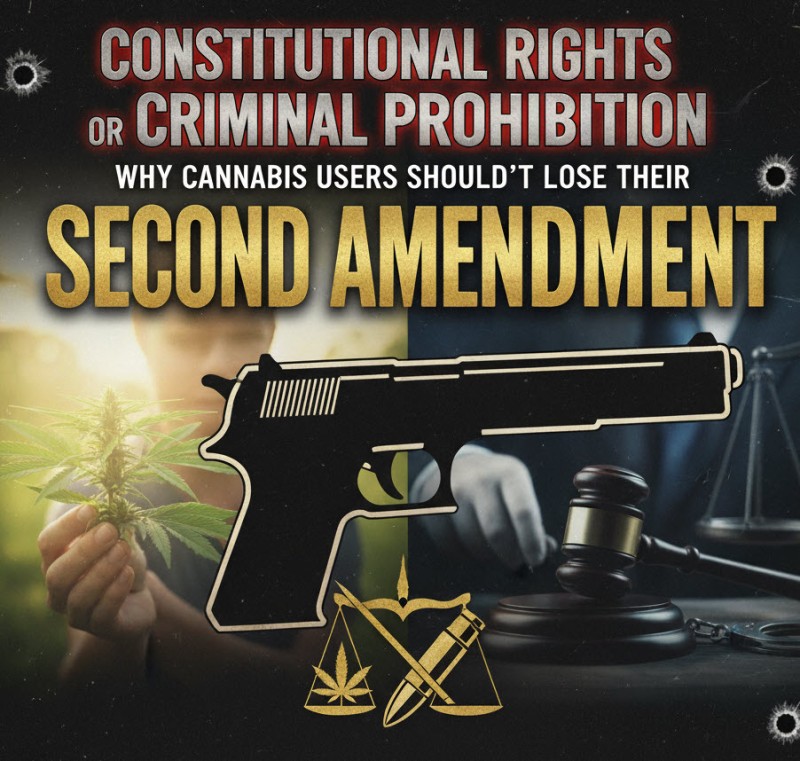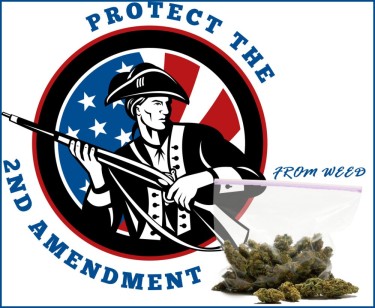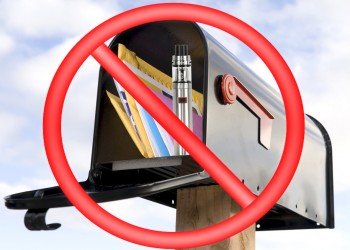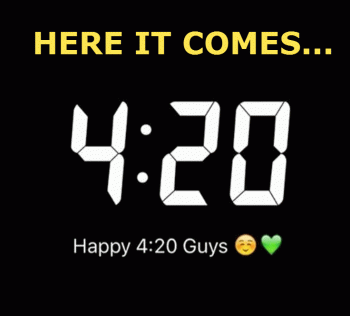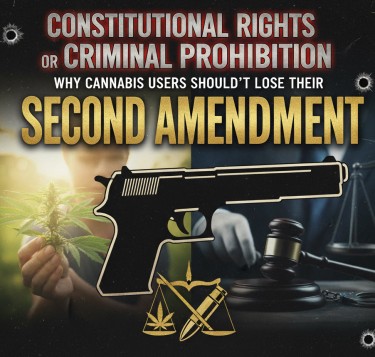
The Supreme Court just agreed to hear a case that perfectly encapsulates the absurdity of cannabis prohibition in 2025: United States v. Hemani, which will determine whether Americans who use marijuana can exercise their Second Amendment right to own firearms. Let that sink in for a moment. We're debating whether one constitutional right can be stripped away because you exercise personal autonomy over your own consciousness using a plant that's legal in half the states and has never caused a fatal overdose in recorded human history.
Ali Danial Hemani, a Texas man, had his felony gun charge dismissed by the 5th Circuit Court of Appeals after judges found that the federal ban on drug users owning firearms is unconstitutional under the Supreme Court's expanded view of gun rights. The Trump administration—despite its supposed support for Second Amendment freedoms—is now asking the Supreme Court to revive the case, arguing that regular cannabis users pose "a serious public safety risk."
This is the same federal law that convicted Hunter Biden before his father pardoned him. The same law that classifies someone who smokes a joint on Saturday evening as equally prohibited from gun ownership as someone addicted to methamphetamine or heroin. The same law that puts millions of Americans—at least 20% of whom have tried marijuana according to federal health data—at risk of felony prosecution simply for exercising two constitutionally protected rights simultaneously.
The government's argument rests on the premise that cannabis users are inherently dangerous, mentally compromised, or otherwise unfit to responsibly own firearms. This is offensive horseshit. It's not based on evidence, data, or any rational assessment of risk. It's based on decades of anti-cannabis propaganda that criminalized a plant to control specific populations, and it represents exactly what the War on Drugs has always been: a mechanism to circumvent constitutionally protected liberties.
The Constitution doesn't say "the right of the people to keep and bear Arms, shall not be infringed—unless they use substances the government disapproves of." The Second Amendment is absolute in its language, just as the Fourth Amendment protects against unreasonable searches and the First Amendment protects speech. Yet cannabis prohibition has been wielded as a tool to strip Americans of these rights for over half a century, creating what amounts to legal second-class citizenship for anyone who chooses to consume a plant.
This isn't about public safety. FBI data shows that over 200,000 Americans were arrested for cannabis last year, the vast majority for simple possession. Cannabis arrests continue to be the primary driver of the War on Drugs, not because marijuana is dangerous, but because it's easy to prosecute and provides a convenient excuse to deprive citizens of their constitutional rights. If this law stands, we're endorsing a system where the government can cherry-pick which constitutional protections apply based on arbitrary prohibitions that lack scientific, moral, or constitutional justification.
The Circular Logic of Cannabis Prohibition and Gun Rights
Let's examine the government's argument with the scrutiny it deserves. The Justice Department claims that Section 922(g)(3) of federal law—which prohibits "an unlawful user of or addicted to any controlled substance" from possessing firearms—is a "narrow" and justifiable restriction on gun rights. They argue it's analogous to historical restrictions on "habitual drunkards" and that regular drug users pose public safety risks that warrant disarming them.
This logic collapses under the slightest examination. First, cannabis is only "unlawful" because the federal government maintains its Schedule I classification—a designation that claims marijuana has "no currently accepted medical use" and "high potential for abuse." This is demonstrably false. Thirty-eight states have legalized medical marijuana. Twenty-four states have legalized recreational use. The federal government itself holds patents on cannabinoids for medical applications. The only reason cannabis users are "unlawful" is because the government says so, creating a circular justification for stripping constitutional rights.
The analogy to "habitual drunkards" actually undermines the government's position. Historical restrictions on intoxicated people carrying firearms were about being actively under the influence—being drunk while armed. They were not blanket lifetime bans on anyone who regularly drinks alcohol. As the 5th Circuit correctly noted, you can bar someone from carrying a gun while intoxicated, but you cannot categorically disarm all people who drink regularly. The same principle applies to cannabis.
The 5th Circuit got this right when they ruled that the government must show someone was actually high while possessing a firearm, not merely that they use cannabis regularly. This is the only constitutionally defensible position. If you're impaired while handling a weapon, that's a legitimate safety concern regardless of the substance involved. But being a regular user—someone who consumes cannabis in the privacy of their home on evenings and weekends—presents no heightened risk compared to the millions of Americans who own guns and also consume alcohol.
The government's case against Hemani illustrates this perfectly. FBI agents found a 9mm pistol, 60 grams of marijuana, and 4.7 grams of cocaine in his home during a search. Hemani was only charged with the gun crime—not drug trafficking, not cocaine possession, just the technical violation of being a cannabis user who owned a firearm. The government tried to paint him as dangerous by mentioning alleged connections to Iran and suspected fraud schemes, but notably filed no charges related to any of that. His lawyers correctly identified this as a "thinly veiled attempt to inject prejudicial and irrelevant allegations" to distract from the weakness of the actual case.
If Hemani truly represented a national security threat, why was the only charge filed a technical gun possession violation? Because the government knows they have no evidence of dangerousness, no evidence he was impaired while handling the weapon, and no legitimate public safety justification for prosecution. They're using cannabis prohibition as a workaround to punish someone they suspect of other activities but can't actually prove.
This is precisely how the War on Drugs has always functioned: as a parallel legal system that allows the government to prosecute people when they lack evidence for legitimate crimes. Can't prove someone is a drug dealer? Arrest them for possession. Can't prove they're involved in terrorism? Charge them with being a cannabis user who owns a gun. The drug war provides infinite opportunities for selective enforcement and pretextual prosecution.
Consider the data: FBI statistics show that cannabis arrests accounted for over 200,000 arrests in 2024 alone, with the vast majority being for simple possession. These aren't dangerous criminals. These aren't public safety threats. These are primarily ordinary Americans being swept into the criminal justice system for consuming a substance that half the states have determined is legal for adults. And once arrested, they face cascading consequences: loss of employment, housing discrimination, student loan ineligibility, and yes, permanent loss of Second Amendment rights.
The government argues cannabis users pose "serious public safety risks," but where's the data? Where are the studies showing that marijuana consumers are more likely to commit gun violence than the general population? They don't exist, because the premise is false. If anything, research suggests cannabis users are less likely to engage in violent behavior than alcohol drinkers. Yet we don't categorically disarm everyone who drinks beer.
The Solicitor General's brief claims the restriction is a "modest, modern analogue of much harsher founding-era restrictions on habitual drunkards." This is historical revisionism. Our founding fathers grew hemp. George Washington cultivated cannabis. Thomas Jefferson praised its versatility. The idea that the framers of the Constitution intended to disarm citizens for using a plant they themselves cultivated is historically illiterate and constitutionally bankrupt.
The War on Drugs: Creating Second-Class Citizens by Design
Let's address what this is really about: the War on Drugs has always been a mechanism to circumvent constitutional protections and create categories of legally disadvantaged Americans. This isn't conspiracy theory—it's documented history confirmed by the very architects of these policies.
John Ehrlichman, President Nixon's domestic policy advisor, admitted in a 1994 interview: "We knew we couldn't make it illegal to be either against the war or Black, but by getting the public to associate the hippies with marijuana and Blacks with heroin, and then criminalizing both heavily, we could disrupt those communities. We could arrest their leaders, raid their homes, break up their meetings, and vilify them night after night on the evening news. Did we know we were lying about the drugs? Of course we did."
This is the origin story of the War on Drugs: a deliberate strategy to criminalize political opposition and minority communities by criminalizing their associated substances. Cannabis prohibition was never about public health or safety. It was about social control, and stripping constitutional rights was always part of the design.
The Thirteenth Amendment abolished slavery and involuntary servitude "except as a punishment for crime whereof the party shall have been duly convicted." This exception created a loophole: criminalize behavior, and you can legally enslave people again. The War on Drugs exploited this loophole brilliantly. By criminalizing substances used disproportionately by Black Americans and political dissidents, the government created a pipeline for mass incarceration that functions as a modern form of legal slavery.
The statistics bear this out. Black Americans are arrested for cannabis at nearly four times the rate of white Americans despite similar usage rates. Once arrested, they face harsher sentences, fewer opportunities for diversion programs, and cascading consequences that include loss of voting rights in many states and permanent prohibition from gun ownership. This isn't accidental disparity—it's the system working exactly as designed.
Section 922(g)(3), the law at issue in Hemani, is a perfect example of how drug prohibition strips constitutional rights. By classifying cannabis users as "prohibited persons," the government creates a permanent underclass of Americans who lose Second Amendment protections not because they've committed violent crimes or shown themselves dangerous, but because they consume a substance that's legal in their state but prohibited by federal fiat.
This is particularly insidious because the prohibition is selective. The government doesn't prosecute everyone who uses cannabis—that would be impossible given that at least 20% of Americans have tried marijuana and millions use it regularly. Instead, they use cannabis prohibition as a tool for selective enforcement, prosecuting people they want to punish for other reasons while ignoring millions of others who commit the same technical violation.
Want to go after someone for unrelated reasons but lack evidence? Check if they use cannabis and own a gun. Instant felony. This is how you create a dragnet where everyone is technically guilty of something, allowing prosecutors unlimited discretion over who to charge. It's the criminalization of everyday behavior, turning constitutional rights into privileges that can be revoked at government whim.
The financial aspect of this system cannot be ignored. The prison-industrial complex generates billions in revenue from incarcerating drug offenders. Private prisons profit from housing them. Police departments get federal funding based on drug arrest numbers. Prosecutors build careers on drug convictions. There are powerful economic incentives to maintain prohibition regardless of its social costs or constitutional implications.
Cannabis arrests remain the primary driver of the War on Drugs precisely because they're easy. Cannabis use is widespread, relatively easy to detect, and carries social stigma that makes prosecution publicly acceptable. The FBI's own data confirms this: of the 200,000+ cannabis arrests in 2024, the vast majority were for possession, not distribution or trafficking. These are low-hanging fruit for law enforcement—easy arrests that pad statistics without actually addressing violent crime or public safety threats.
The system also creates a self-perpetuating cycle. Once someone is arrested for cannabis, they enter the criminal justice system where they're subject to drug testing, probation conditions, and surveillance that makes future arrests more likely. They lose job opportunities, making economic survival more difficult and crime more attractive. They lose gun rights, making self-defense impossible in dangerous neighborhoods. They become second-class citizens whose constitutional protections are conditional rather than guaranteed.
This is by design. The War on Drugs was never intended to eliminate drug use—that was always an impossible goal. It was intended to create a legal framework for controlling populations deemed threatening by the state. Cannabis prohibition specifically targeted counterculture movements in the 1960s and 70s, Black communities organizing for civil rights, and anyone who rejected mainstream social conformity. Stripping gun rights from these populations was always part of the plan.
The Sticky Bottom Line: Constitutional Rights Aren't Negotiable
The Supreme Court faces a straightforward question in United States v. Hemani: Can the government strip constitutional rights from millions of Americans based on their consumption of a substance that's legal in half the states, has documented medical applications, and poses no heightened public safety risk compared to legal intoxicants?
The answer should be equally straightforward: No.
The Second Amendment doesn't include a drug exception. The Constitution doesn't empower the federal government to create categories of second-class citizens who forfeit fundamental rights because they consume substances the government disapproves of. The War on Drugs has always been a constitutional end-run, a way to punish and control populations that can't be targeted directly because the Constitution protects them. This case offers the Court an opportunity to finally acknowledge that reality and restore constitutional protections to millions of Americans.
The 5th Circuit got it right: you can prohibit someone from possessing firearms while actively intoxicated, just as you can prohibit drunk driving or public intoxication. That's a legitimate safety concern. But you cannot categorically disarm everyone who drinks alcohol, and you cannot categorically disarm everyone who uses cannabis. The constitutional standard must be impairment at the time of possession, not status as a regular user.
The practical implications of ruling for the government are staggering. At least 20% of Americans have tried marijuana. Tens of millions use it regularly. Half the states have legalized recreational use, and 38 states allow medical use. If the Court upholds Section 922(g)(3), it will effectively create a massive class of technical felons—people who are legal cannabis users under state law but prohibited persons under federal law. This is untenable in a constitutional republic.
More fundamentally, this case exemplifies why cannabis prohibition must end entirely. The federal government's continued classification of marijuana as Schedule I—more dangerous than cocaine or methamphetamine according to the DEA—is scientifically indefensible and constitutionally destructive. As long as cannabis remains federally prohibited, it will be weaponized to strip rights from citizens who would otherwise face no legal consequences.
The War on Drugs has failed by every measurable metric. It hasn't reduced drug use. It hasn't made communities safer. It hasn't addressed addiction or public health. What it has accomplished is mass incarceration of nonviolent offenders, destruction of families and communities, and creation of a legal framework for circumventing constitutional protections. Cannabis arrests remain the primary driver of this failed system, with over 200,000 Americans arrested last year for a substance that millions use responsibly and legally under state law.
The argument that cannabis users are inherently dangerous is offensive to the millions of taxpaying Americans who use marijuana responsibly while maintaining careers, families, and civic responsibilities. These aren't criminals. They're your neighbors, colleagues, and family members. They're military veterans using cannabis for PTSD. They're cancer patients managing symptoms. They're adults making informed choices about their own consciousness. And under the Constitution, they have the same right to keep and bear arms as any other citizen.
The government's position in Hemani is that cannabis use alone justifies permanent disarmament. This cannot stand. If the Supreme Court endorses this reasoning, it will signal that any constitutional right can be stripped away through the mechanism of drug prohibition. The government could extend this logic to other rights: cannabis users can't vote, can't speak freely, can't be free from unreasonable searches. After all, if they pose such a "serious public safety risk" that they can't own guns, why should they enjoy any constitutional protections?
This is the slippery slope that the 5th Circuit recognized and rejected. Once you accept that the government can create prohibited classes of citizens based on substance use that the Constitution doesn't mention, you've abandoned constitutional governance entirely. You've created a system where rights are privileges dispensable at government discretion, which is precisely what the Constitution was designed to prevent.
Cannabis users aren't mentally ill. They aren't inherently dangerous. They aren't criminals deserving of second-class citizenship. They're Americans exercising personal autonomy in a supposedly free society, and their constitutional rights should be inviolable regardless of which substances they choose to consume. The Supreme Court should affirm what the 5th Circuit recognized: Section 922(g)(3) is an unconstitutional infringement on Second Amendment rights that cannot be justified by the failed policies of the War on Drugs.
The broader fight continues. Cannabis must be descheduled at the federal level, ending the legal fiction that allows these constitutional violations. Until that happens, every cannabis arrest, every prosecution, every rights violation under color of drug law is a stain on American justice. The War on Drugs has always been a war on constitutional liberty, and cannabis users deserve full restoration of their rights as citizens.
The Court's decision in Hemani will determine whether millions of Americans can exercise their constitutional rights or whether the government can continue using cannabis prohibition as a tool for selective disarmament and social control. The Constitution demands one answer. I hope the Supreme Court has the wisdom to provide it.
